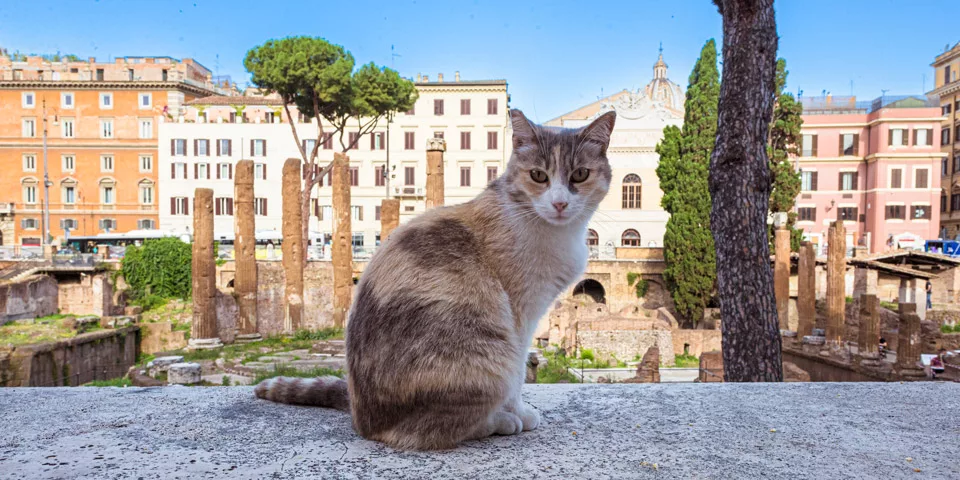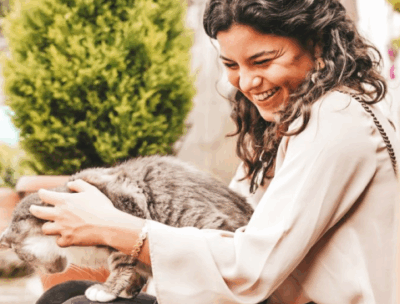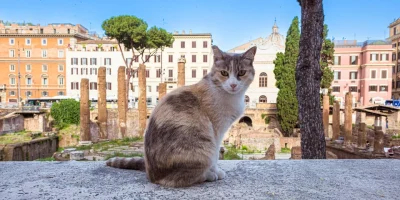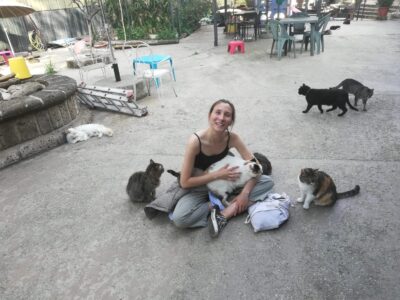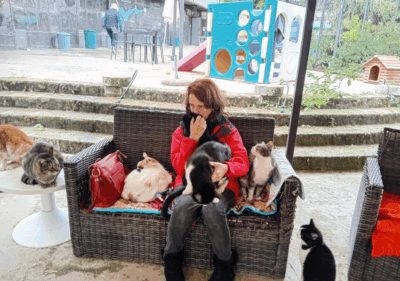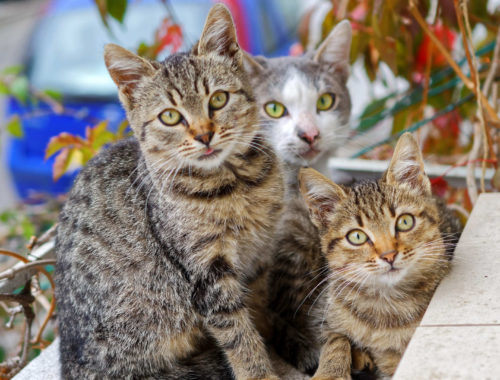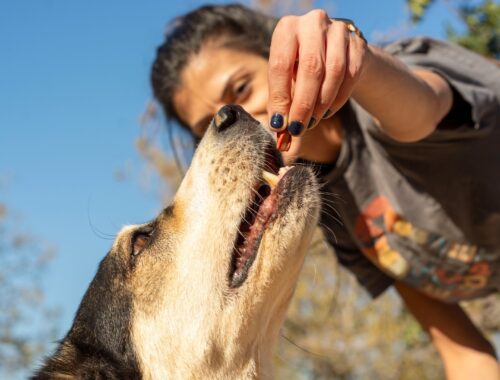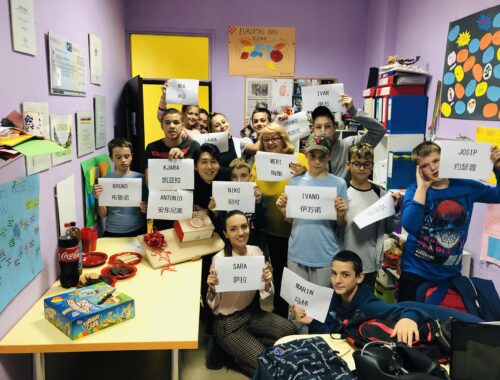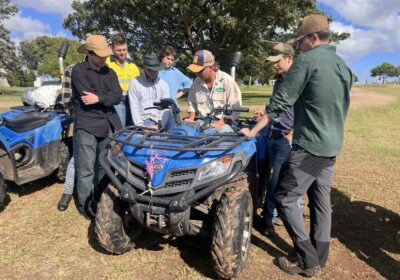Join vital animal welfare efforts in Rome and support the care of rescued cats at under-resourced local shelters. As an Oyster volunteer, you’ll assist with feeding, cleaning, and providing enrichment for stray and abandoned cats—many recovering from neglect or trauma. Help local staff maintain safe, welcoming spaces, while contributing to long-term change through awareness and responsible adoption advocacy. Through your work, you’ll make a real difference to animal lives and experience Rome from a compassionate, purpose-driven perspective.
Duration: 1 – 12 weeks / Internship 1-9 months
Dates: Click here for availability calendar
Arrival day: Sunday
Return day: Saturday
Age: 18+
Share with friends...
Highlights
- Hands-On Animal Care: Feed, clean, and socialise rescued cats while supporting essential daily shelter tasks.
- Support Local Shelters: Help underfunded shelters care for stray and special-needs cats in central Rome.
- Raise Awareness: Contribute to advocacy around adoption, sterilisation, and responsible pet ownership.
- Make a Real Impact: Free up staff time and improve the wellbeing of over 260 cats through daily care.
- Experience Rome with Purpose: Stay centrally, enjoy Italian food, and explore the city as an ethical traveller.
Italy is home to tens of thousands of stray and abandoned animals—especially cats—many of whom have suffered from mistreatment, neglect, or trauma. Despite legal protections, enforcement is inconsistent, and many shelters remain overwhelmed, underfunded, and understaffed. In recent years, the number of strays has grown dramatically due to factors like unwanted litters, pandemic-related pet abandonment, and financial strain on families. Rome, a city famed for its history and culture, also faces a quieter crisis: the rising need for compassionate, consistent animal welfare.
Become part of a hands-on animal care project in Rome, where you’ll support dedicated local organizations providing daily care, medical attention, and a safe haven for hundreds of rescued cats. As a volunteer, you’ll help feed the animals, clean living spaces, assist with basic shelter maintenance, and offer social interaction that helps cats heal from trauma and regain trust in humans. Many of the animals you’ll meet are not yet adoptable—your presence can help change that by making them feel safe, calm, and loved.
You may also contribute to awareness efforts around responsible pet ownership and the importance of sterilization, adoption, and animal rights. Volunteers play an essential role in freeing up time for local staff to focus on more specialized care, particularly for sick or special needs cats. With shelters open year-round and housing over 260 cats, your help ensures these animals get the attention and support they deserve.
This program is ideal for anyone who cares deeply about animals and wants to be part of long-term, meaningful solutions to stray overpopulation. Anyone can join, especially those who are simply looking to give back through responsible travel, their time and energy – which will be well spent! No previous experience is required—just a love for animals, a willingness to help, and an open mind.
You’ll be based in central Rome at a well-located hostel, with breakfast and dinner provided daily. Full orientation is included, along with guidance on navigating the city, understanding the local culture, and preparing for your volunteer placement. Volunteers typically work morning shifts, with afternoons and weekends free to explore Rome’s landmarks, hidden gems, and world-famous cuisine.
By joining this program, you’ll actively support ethical animal care in Italy, help shelters operate more effectively, and give vulnerable animals a second chance. It’s a chance to do something deeply rewarding—while experiencing Rome in a way few tourists ever do.
In Rome, your compassion can help rewrite the story for animals in need—one paw at a time.
Daily Cat Care and Shelter Support: Step into the heart of animal welfare work by helping feed, clean, and care for over 260 rescued cats in a local Roman shelter. Your daily tasks will ensure the shelter remains a safe, hygienic, and enriching space for animals recovering from trauma, illness, or abandonment.
Socialisation and Emotional Recovery: Many of the cats have suffered neglect or mistreatment, making human interaction a vital part of their rehabilitation. By spending time with them—playing, grooming, or simply sitting nearby—you’ll help rebuild their confidence, reduce stress, and increase their chances of adoption.
Cleaning and Shelter Maintenance: A clean environment is essential to the health of the animals. Volunteers help with routine maintenance, including litter box changes, disinfecting common areas, and ensuring food and water bowls are always clean and full.
Assist with Awareness and Outreach: Support the shelter’s broader mission by helping document your experience through photos or posts (with permission), contributing to campaigns around responsible adoption, sterilisation, and animal rights in Italy.
Support Special Needs Cats: Volunteers allow shelter staff to dedicate more time to cats with medical issues or extra needs. Your help ensures that all animals receive attention and care, no matter their condition.
Through your involvement, you’ll not only support daily operations but contribute to lasting, positive outcomes for vulnerable animals—while developing practical animal care skills, gaining insight into shelter work, and connecting with Rome’s compassionate volunteer community.
Veterinary Internship in Rome, Italy
Can I do this as an internship?
Yes — you can complete this veterinary placement as a formal internship. It’s perfect for veterinary students, pre-vet applicants, and recent graduates looking to gain practical clinical experience abroad while contributing to meaningful animal welfare work.
Quick Facts:
-
Location: Rome, Italy
-
Duration: 1–9 months
-
Who it’s for: Veterinary students, graduates, pre-vet applicants
When you book your veterinary internship, you’ll join a hands-on program supporting real cases in local clinics. You’ll assist experienced veterinary professionals with:
-
Monitoring and discussing clinical cases
-
Observing and supporting consultations
-
Assisting in soft tissue surgeries
-
Helping with treatments such as blood collection, bandaging, and fluid therapy
This internship allows you to develop real-world veterinary skills while working in a cross-cultural setting that enhances both your technical expertise and professional confidence.
What’s Included:
-
Internship certificate on completion (suitable for university credit or CPD)
-
Hostel accommodation included for the full duration
-
Three meals per day (breakfast, lunch, and dinner)
-
Welcome orientation and guided city tour to help you settle in
-
24/7 in-country support for peace of mind
-
Weekly check-ins with your internship coordinator
-
Optional professional reference for future job or university applications
Interns typically work Monday to Friday, 5–7 hours a day, with flexible durations ranging from 1 to 9 months. The schedule is designed to give you valuable clinical exposure while allowing time to experience the local culture.
Whether you’re building a pre-vet résumé, meeting university placement requirements, or simply looking to gain impactful experience, this veterinary internship provides everything you need.
Your Role in Rome:
As a veterinary intern in Rome, you’ll engage in a variety of tasks designed to provide comprehensive experience and contribute to the success of the project. Your responsibilities may include:
-
Monitoring and discussing clinical cases: Strengthen diagnostic and decision-making abilities by assessing real veterinary cases.
-
Supporting and observing consultations: Apply clinical knowledge while learning to interact with both animals and their caregivers.
-
Assisting in soft tissue surgeries: Develop practical skills in surgical procedures, aseptic techniques, and post-operative care.
-
Supporting treatments: Build a solid foundation in administering and managing veterinary care through tasks like blood collection, bandaging, and fluid therapy.
-
Contributing to the care of abandoned and mistreated animals: Gain valuable insight into the ethical responsibilities of veterinary practice in non-profit settings.
-
Gaining cross-cultural experience: Learn how veterinary approaches vary across cultural and socio-economic contexts, preparing for a globally diverse veterinary career.
This internship offers a unique opportunity to make a tangible impact on animal welfare while advancing your veterinary career in a supportive and immersive environment.
As a volunteer in Rome, you’ll be based at a centrally located hostel in the heart of the city — just a short walk from the Colosseum and within easy reach of the Vatican. This comfortable, social accommodation is well-connected to public transport, giving you the freedom to explore Rome’s rich history and culture during your time off.
You’ll share a same-gender dorm room with fellow volunteers and have access to essential amenities like bedding, towels, and a personal locker (please bring your own padlock). The hostel reception is on hand for any additional requests, including extra linen or support with room utilities. Check-in starts at 2pm, with check-out before 10am on your departure day.
Daily breakfast, lunch and dinner are included and served at a cafe below the hostel, and at a nearby restaurant. You’ll receive a meal voucher and should notify the staff of any food allergies or dietary needs in advance. This welcoming space offers a relaxed and international atmosphere — perfect for connecting with like-minded volunteers as you contribute to meaningful animal welfare or environmental work in Rome.
Food Provided:
-
Three meals per day included: breakfast, lunch and dinner are provided .
- Breakfast is ‘continental’ and at a lovely little cafe next door. Lunch and dinner are provided daily at a larger restaurant not far from the hostel
-
Meals include traditional Italian dishes, often featuring fresh, seasonal ingredients. There is a choice or hot and cold dishes
-
You’ll receive a meal voucher or a sheet to tick your name off for restaurant staff before each meal
-
Special dietary needs or allergies should be communicated in advance to ensure proper accommodation
- Packed lunch is possible for those who want it when booked in advance
Food Not Provided:
-
Meals are not provided during independent travel, on days off, or if you miss a meal due to your schedule
-
Snacks and extra food outside of meal times are not included
Travel arrangements
Airport: Rome’s main airports are Leonardo da Vinci International Airport (Fiumicino) FCO
Arrival Day: Sunday — you’ll be collected from the airport or train station
Departure Day: Saturday
Included
- Access to your own personal ‘My Oyster’ account – our online portal where you can find out much more about the program and manage your booking
- Dedicated contact time with an experienced destination manager to discuss the project, answer any of your questions and for us to find out more about you
- Help and advice from our UK office before arrival and whilst you are away
- Pre-departure information covering medical, safety and project advice
- Gold level, 24/7 Pharos crisis management and incident support cover
- Financial protection: ATOL (if we book your flights).
- Thorough orientation on arrival
- In-country support
- Accommodation (see the ‘accommodation’ section above for details)
- Advice on visa requirements
- Oyster plants a tree in Africa with TreeAid to help reduce the impact of global carbon emissions
- Airport or train station pick-up and transfer to your accommodation in Rome
- Three daily meals: breakfast, lunch and dinner provided at restaurant
- Orientation session and city tour on Monday, including local transport guidance and cultural insights
- Comfortable shared accommodation with bedding, towels, and lockers (bring your own padlock)
- Meal vouchers for breakfast, lunch and dinner
- Local coordinator support during your entire stay, including on arrival
- All necessary tools and materials for your volunteer activities
- Ongoing guidance and support from the on-site team
On your return:
-
Certificate of Recognition (available upon request)
-
References (available upon request)
Not Included
- Flights – as an ATOL bonded company, Oyster can book flights for you
- You need a valid passport that meets the requirements of the country you will be travelling to
- Insurance (covering your time with Oyster and any planned independent travel)
- Any costs associated with changing your return flight date if you need to
- Independent travel costs
- Home country travel costs
- Spending money for additional trips, food and entertainment
- Return costs to the airport
FAQ's
Your volunteering week in Rome typically runs from Monday to Friday, starting with an in-depth orientation day on Monday. This includes a guided tour of central Rome, help navigating public transport, and a full introduction to your animal care placement and the local context.
Volunteer shifts are usually in the morning or early afternoon, depending on the needs of the shelter and the season. You’ll have at least two days off, generally over the weekend, to relax or explore the city at your own pace.
A typical day might look like this:
08:00 – 09:30: Breakfast at the hostel cafe and get ready for the day
09:30 – 13:30: Volunteer shift — activities may include feeding and socialising cats, cleaning litter boxes, refreshing food and water, shelter maintenance, or helping with awareness initiatives
13:30 – 15:00: Lunch at the restaurant and downtime
15:00 – 18:00: Free time, sightseeing, or optional cultural activities
19:00 – 21:00: Dinner at the restaurant followed by social time or rest
Afternoons and evenings are yours to enjoy — whether you’re exploring historic Rome, bonding with fellow volunteers, or simply unwinding after a meaningful day helping rescued animals.
No specific qualifications or previous experience are required to join this animal care project in Rome. You don’t need to speak Italian, but a basic level of English is important for communication with coordinators, shelter staff, and fellow volunteers. What’s most important is a love for animals, a compassionate attitude, and a willingness to take part in hands-on, routine tasks.
To ensure the wellbeing of the animals and the smooth running of the shelter, volunteers are asked to follow a few simple guidelines:
-
Be punctual – Arriving late can disrupt the team and reduce time spent with the animals. Your reliability matters.
-
Respect animal space – Many cats have been through trauma. Let them come to you and avoid forcing interaction.
-
Limit phone use – Please don’t use your phone during your shift unless it’s for a permitted activity or an emergency.
-
Follow shelter rules – Do not feed the cats or give treats unless instructed. Many are on specific diets.
-
Take training seriously – Learn how to interact with the animals safely and ask questions if you’re unsure.
-
Show up consistently – If you’re unable to attend a shift, notify both your coordinator and the shelter staff in advance.
This program is ideal for responsible, caring volunteers who want to make a real difference in the lives of rescued animals while contributing to long-term animal welfare efforts in Italy.
Whilst late-availability is possible, we would advise booking as soon as you can to guarantee your ideal dates. Our projects are very popular and spaces can fill up several months in advance, especially for the months of June to September.
Spring (March to May):
Spring in Rome offers mild temperatures ranging from 15°C to 20°C, making it ideal for outdoor activities like gardening and community events. The city comes alive with blooming flowers, such as azaleas on the Spanish Steps and cherry blossoms in the EUR district. Cultural events, including Easter celebrations, add to the vibrant atmosphere.
Summer (June to August):
Summers are warm and sunny, with temperatures often exceeding 30°C. While the heat can be intense, it’s a lively time with numerous festivals and open-air events. Volunteers should be prepared for early morning or late afternoon work to avoid peak heat hours.
Autumn (September to November):
Autumn brings comfortable temperatures between 20°C and 25°C, perfect for volunteering activities. The city experiences fewer tourists, allowing for a more relaxed exploration of Rome’s historic sites. Autumn is also harvest season, offering opportunities to engage in agricultural tasks and enjoy seasonal Italian cuisine.
Winter (December to February):
Winters are mild, with temperatures ranging from 8°C to 12°C. This season sees fewer tourists, providing a quieter experience. While some outdoor activities may be limited due to shorter daylight hours, it’s an excellent time for indoor workshops and cultural immersion.
While your programme covers essential costs such as accommodation, breakfast,lunch and dinner, and airport or train station pick-up, you’ll need to budget extra for personal expenses during your stay in Rome.
You should plan to set aside money for:
-
Public transportation, especially for getting to your volunteer placement and exploring the city — approximately €3–€5 per day depending on your travel habits
-
Snacks, drinks, and personal items outside of meal times
-
Cultural activities or tours during your free time — entry fees for attractions like the Colosseum or Vatican Museums may range from €12 to €25
-
Souvenirs, SIM cards, or small essentials
-
A small amount of cash for emergencies
Rome is a major European capital, and while many daily costs are manageable, your total budget will depend on your personal lifestyle and travel preferences. Having a daily budget of €15–€25 for extras is a good starting point for most volunteers.
Rome is a well-connected city where cards are widely accepted, including at most restaurants, shops, and public transport machines. However, it’s still a good idea to carry some cash in euros, especially for small purchases or local markets.
-
Bring at least two bank cards in case one is lost or doesn’t work
-
Inform your bank that you’ll be travelling to Italy to avoid potential card blocks
-
Cash machines (ATMs) are widely available throughout Rome, including near your accommodation
-
Keep a small amount of emergency cash with you, ideally in a secure place separate from your cards
By preparing ahead, you’ll avoid unexpected issues and manage your spending easily during your time volunteering in Rome.
Most travellers from outside the European Union can stay in Italy for up to 90 days within a 180-day period without a visa and will receive a tourist entry stamp on arrival.
Ensure your passport is valid for at least six months beyond your departure date. If you plan to stay longer than 90 days, you’ll need to apply for a visa through Italian authorities.
Check with your local embassy or consulate for the most up-to-date entry requirements before travelling.
Most of our volunteers are independent travellers and you will become part of a group of people from around the world here. It is fine to travel with friends or as part of a small group too however- more the merrier!
You should visit your doctor or travel nurse to find out what vaccinations you will need. Your routine vaccinations will need to be up to date. You should follow your doctor’s advice.
Please see the Fit for Travel website.
Rome has a number of well-equipped hospitals and medical clinics. Should you need medical attention during your stay, you’ll have access to reputable healthcare facilities located within the city.
This major public hospital offers emergency services and is approximately a 15-minute walk from the hostel. In case of illness or emergency, the local team will assist you in reaching the hospital. The general emergency number in Italy is 112
Low Crime Rate: Rome is generally a safe city for international volunteers and travellers. While violent crime is rare, petty theft such as pickpocketing can occur, particularly in crowded tourist areas and on public transport. Basic precautions—like keeping valuables secure and staying alert in busy places—are strongly advised.
Supportive Local Environment: Romans are known for their warmth and hospitality. As a volunteer, you’ll be welcomed into a community that values inclusivity, respect, and shared purpose. The local team is always on hand to provide support and advice.
Safe Day-to-Day Activities: Whether you’re volunteering in parks, exploring historical landmarks, or taking public transport, Rome is safe to navigate. Stick to well-lit streets after dark and follow all guidance from your local coordinator.
Health and Emergency Support: In the event of illness or injury, you’ll have access to nearby medical care at San Giovanni Addolorata Hospital, a major public hospital just 15 minutes’ walk from your accommodation. Italy’s emergency number is 112.
Transport and Infrastructure: Rome’s public transport system is extensive and reliable, with metro, buses, and trams making it easy to get around safely. Local staff will help you understand the best routes and ticket options.
As with any travel experience, staying aware of your surroundings and following local guidelines will help ensure a safe, rewarding time in Rome.
You’ll have access to free Wi-Fi in the common areas of your volunteer accommodation in Rome. The connection is generally reliable and suitable for browsing, sending emails, and making video calls, so you can stay connected with friends and family during your stay.
Many cafés and public spaces around Rome also offer free internet access. We recommend downloading WhatsApp before arrival so you can be added to the volunteer group chat and easily communicate with coordinators and fellow volunteers once you’re in Rome.
Mobile phone reception in Rome is generally strong and reliable across the city, including at the volunteer accommodation. All major networks offer good coverage, so you’ll be able to make calls, send messages, and use mobile data without issue.
For more affordable rates and convenience, you may want to purchase a local SIM card upon arrival in Rome. Coordinators can help direct you to nearby shops that offer prepaid SIM options.
Rome, Italy operates on Central European Time (CET), which is UTC+1.
During daylight saving time — from the last Sunday in March to the last Sunday in October — Rome follows Central European Summer Time (CEST), which is UTC+2.
In Rome, Italy, you’ll need a Type C or Type F plug adapter for your electronic devices. The standard voltage is 230 V with a frequency of 50 Hz.
Most European and UK devices are compatible. However, travellers from regions like North America may also need a voltage converter in addition to a plug adapter to safely use their electronics.
As a volunteer in Rome, you’ll have plenty of free time to explore the city and experience Italian culture. Volunteer activities usually take place for 3-5 hours per day, Monday to Friday, giving you the rest of the day to relax or discover Rome at your own pace.
You’ll also have at least two full days off, typically over the weekend, which is the perfect opportunity to visit iconic landmarks like the Colosseum, Vatican City, or Rome’s hidden gardens. With this flexible schedule, you can enjoy authentic cuisine, join local events, or simply unwind with fellow volunteers in one of Europe’s most historic cities.
Supervision will be fairly intensive during the first few days, when you will receive a thorough induction and work-related training. Once you are comfortable with things, you might not always have a supervisor working alongside you, but there will always be staff and other volunteers around to help, and you will always be accompanied for any high risk activities.
Staff at Oyster’s head office and in-country will be responsible for your safety and welfare while you are at the project. This will start from the moment you are picked up from the airport until the end of your project. Before and after these times, you will be outside Oyster’s responsibility and should make sure that you act safely and avoid risk. This is also true if you choose to leave the project during your time off. We will give you plenty of guidance and advice about this.
Would you like to chat to Kate, who manages this programme? Just call +44 (0) 1892 771 973 or email: – [email protected].
